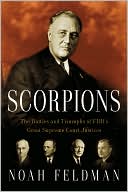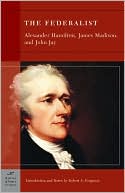A Nation of Laws: America's Imperfect Pursuit of Justice
America's founders extolled a nation of laws, for they knew that only a fairly enforced legal system could protect liberty and property against corruption and tyranny. Nearly two and a half centuries later, that system remains the ultimate safeguard for us all. With concise but penetrating and provocative insights, the eminent Peter Charles Hoffer recaptures the spirit of this grand enterprise while never losing sight of its human face.\ The distillation of four decades of stellar writing,...
Search in google:
America's founders extolled a nation of laws, for they knew that only a fairly enforced legal system could protect liberty and property against corruption and tyranny. Nearly two and a half centuries later, that system remains the ultimate safeguard for us all. With concise but penetrating and provocative insights, the eminent Peter Charles Hoffer recaptures the spirit of this grand enterprise while never losing sight of its human face.The distillation of four decades of stellar writing, Hoffer's book is a wise and illuminating meditation on the key concepts, history, evolution, and importance of American law. He brings the law to life through brief narratives and portraits drawn from the pages of our nation's history. He takes his readers on a tumultuous journey from the Salem witchcraft trials through the divisive debates over slavery; the long struggles for equality and civil rights; the moral and culture wars over abortion, gay rights, and the teaching of evolution; and recent controversies concerning the rule of law in wartime.In a very compact space, Hoffer has a great deal to say about the role of law, lawmakers, law cases, lawyers, litigants, judges, law professors, and public opinion in creating and recreating the fabric that weaves all of these elements together. He pays particular attention to the criminal trial by looking at the legal proceedings against slave liberator John Brown, feminist Susan B. Anthony, and teacher of evolution John Scopes. He also explores what happens when the law is stretched to the breaking point by revisiting such events as the Stono Slave Rebellion, the Seneca Falls women's rights convention, and FDR's paradigm-shifting New Deal speech.Throughout, Hoffer carefully weighs the promise and vitality of our laws against its flaws and historical failures, for our legal system has not reflected a strong linear progress from inequality and privilege toward perfected liberty and dignity for all. His crystal clear vision of our legal history reminds us of the ambiguities and contradictions, quarrels and confrontations, that mirror the struggles within American history itself and reinforce the central role of law in American life. Library Journal Hoffer (history, Univ. of Georgia) here takes a philosophical and conceptual approach to the history of American law. Thematic rather than chronological, his six chapters each explore something that has impacted the development of American law from Colonial times to the present. The first three chapters discuss the politics of law and the impact of legal education. Chapter 4 discusses the Salem witch trials of 1692 as a landmark criminal trial because church law and civil law were in conflict, with other trials highlighted including the 1872 trial of Susan B. Anthony for illegal voting because it shows the historic conflict between natural rights and civil law. Chapters 5 and 6 explore critical turning points in American law, episodes that eventually led to lasting change. In Chapter 6, Hoffer also explores events that provoked debate about the nature of the law, particularly the 1994 murder trial of O.J. Simpson, which renewed a fierce debate over the role of race and money in the judicial system. VERDICT Best for those interested in legal philosophy and who already have a working knowledge of the American legal system or are students of the subject.—Becky Kennedy, Atlanta-Fulton P.L.
\ Library JournalHoffer (history, Univ. of Georgia) here takes a philosophical and conceptual approach to the history of American law. Thematic rather than chronological, his six chapters each explore something that has impacted the development of American law from Colonial times to the present. The first three chapters discuss the politics of law and the impact of legal education. Chapter 4 discusses the Salem witch trials of 1692 as a landmark criminal trial because church law and civil law were in conflict, with other trials highlighted including the 1872 trial of Susan B. Anthony for illegal voting because it shows the historic conflict between natural rights and civil law. Chapters 5 and 6 explore critical turning points in American law, episodes that eventually led to lasting change. In Chapter 6, Hoffer also explores events that provoked debate about the nature of the law, particularly the 1994 murder trial of O.J. Simpson, which renewed a fierce debate over the role of race and money in the judicial system. VERDICT Best for those interested in legal philosophy and who already have a working knowledge of the American legal system or are students of the subject.—Becky Kennedy, Atlanta-Fulton P.L.\ \








